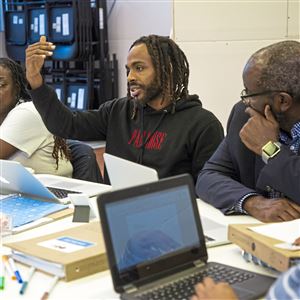Since the Three Rivers Business Alliance launched in 2018 to assist LGBT-owned firms in the Pittsburgh region and neighboring states, the group has participated in trade shows and exhibits to boost its profile and attract members.
Ron Hicks, alliance board president, continues to be surprised by the most frequent question he gets at such events: What does LGBT stand for?
“I know people are confused over all the acronyms,” said Mr. Hicks, particularly those that have been added in recent years to the standard acronym for lesbian, gay, bisexual and transgender.
Those include Q for queer or questioning, I for intersex and A for asexual. The alliance uses “LGBT+” in its formal literature to include all of them.
Once Mr. Hicks offers his explanation, many say, “Oh, you’re that organization.”
That means there’s work to be done.
“So, obviously, we need to get our name out there and educate people a little bit more,” he said.
A local affiliate of the National LGBT Chamber of Commerce, formerly known as the National Gay & Lesbian Chamber of Commerce, the alliance welcomes businesses owned by LGBT individuals and others who support them. It was purposeful to include “alliance” in the Pittsburgh group’s name, Mr. Hicks said, to “make certain everyone understood we had the support of our allies to help us.”
The group has just over 50 members, including some major Pittsburgh organizations that sponsor or support it: PNC Financial Services Group, Covestro, Highmark Health, UPMC, and law firms K&L Gates and Porter Wright Morris & Arthur, where Mr. Hicks is a partner.
Besides advocacy, the alliance helps educate members about issues such as health care benefits, how to deal with workers who are transgender, and how to use correct gender pronouns — he, she, they or others — for workers and customers.
It also created a foundation to fund education efforts and to raise money for startup firms.
A major thrust of the group’s mission is to help LGBT firms become certified as minority-owned so they can compete for contracts from businesses seeking to diversify their supply chains.
Before the alliance was created, some firms in the Pittsburgh area joined the Keystone Business Alliance in Harrisburg or the Independence Business Alliance in Philadelphia to become certified and minority-owned enterprises.
The national chamber certifies firms that are 51% owned by LGBT individuals and that meet other qualifications including reference checks.
In a region that includes southwestern Pennsylvania, northern West Virginia, southeastern Ohio and northwestern Maryland, membership is expected to grow as stigmas associated with being LGBT diminish.
“That’s the biggest challenge” for businesses, Mr. Hicks said. “Being able to compete openly. People are fearful if they disclose who they are personally, maybe somebody implicitly or explicitly will refuse to do business with them.”
Because LGBT firms may hesitate to promote their sexual orientation, the Pittsburgh alliance maintains an online directory accessible only to its members.
A 2016 study by the National LGBT Chamber of Commerce found 1.4 million LGBT business owners in the U.S. employed more than 33,000 people and contributed $1.7 trillion to the national economy.
Among businesses in the study, 66.6% were gay-owned, 29.1% lesbian-owned, 2.3% bisexual-owned and 2% transgender-owned.
The national chamber launched in 2002. Founding partners include corporate giants IBM, American Airlines and American Express.
Mr. Hicks, 57, practices commercial litigation and is the solicitor for the Republican Committee of Allegheny County. When he came out as gay at age 39, he figured he might lose a few clients. But he gained more than he expected.
“For me, it’s important to show younger people, particularly those who want to practice law, that it’s OK to be out,” he said.
A couple of Pittsburgh firms that belonged to the Keystone Business Alliance urged him to get involved in starting a local alliance, and his previous law firm, Meyer, Unkovic & Scott, agreed to become a national legal industry alliance partner.
When Mr. Hicks joined Porter Wright in July, that firm took over the partnership, which aims for diversity in the firms that corporations hire for outside legal work.
The alliance has participated in LGBTQ Pride marches and celebrations held in Pittsburgh and in Weirton and Morgantown, W.Va., as well as various inclusion events such as an LGBTQ+ Unity Summit held in September at Duquesne University. That summit featured representatives from American Eagle Outfitters, Kennametal, Chubb Insurance and Geisinger Health System.
Such business events help solidify support for the community and LGBT-owned firms because they go beyond “rainbow-washing,” Mr. Hicks said. While many organizations display rainbow flags and colors that symbolize LGBT identity and pride, they may not have policies in place to support individuals or firms, he said.
More exposure for LGBT business owners can also help break the long held stereotype that “most are florists or bar owners,” Mr. Hicks said.
The alliance hasn’t met resistance to its message among corporations in the Pittsburgh region, he said.
“It’s more a level of not understanding what we’re trying to do. If we sit down and explain to them our resources for their employees or supplier diversity, they’re more than willing to talk and have us at the table.”
For information, go to www.3rba.com.
Joyce Gannon: jgannon@post-gazette.com or 412-263-1580.
This story was updated at 5:45 p.m., Tuesday Nov. 5, 2019.
First Published: November 4, 2019, 11:00 a.m.






















